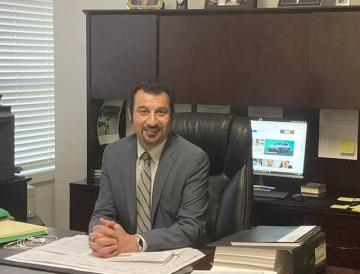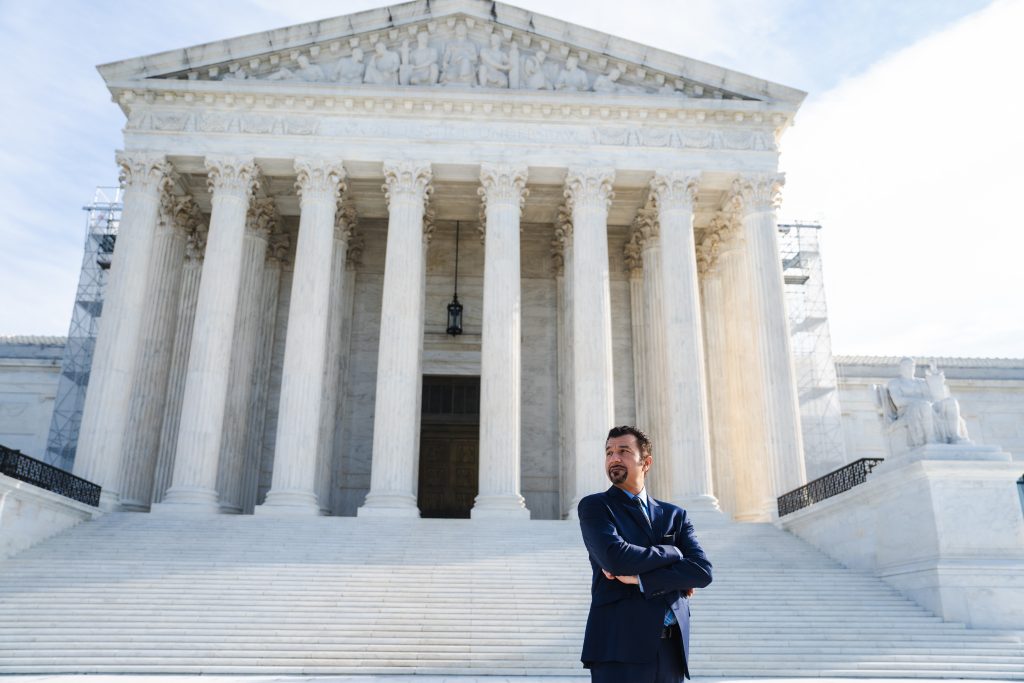
Immigration Lawyer Saad Ahmad L’OO Shows That Appellate Practice Isn’t Just for Large Firms

Supreme Court recently heard asylum seeker’s deportation case, RWU Law Class of 2000
Immigration attorney Saad Ahmad L’00 is the rare attorney with extensive experience on both trial and appeal. He estimates that he has done more than forty appellate oral arguments and written around a hundred appeal briefs before multiple federal appellate courts around the country.
Unlike many appellate advocates who work for large white-shoe law firms, though, Ahmad has always been a small firm or solo practitioner. Currently, his firm, Saad Ahmad and Associates, includes Ahmad and another attorney.
On January 8, 2024, Ahmad reached a milestone, as the Supreme Court heard a case on appeal from a matter he had successfully argued before the U.S. Court of Appeals for the Ninth Circuit.
A question of notice
In Garland v. Singh (Docket No. 22-884), Ahmad represents Varinder Singh, an immigrant from India who is seeking asylum in the United States. Singh, a practicing Sikh and supporter of a Sikh nationalist political party, claims that he was attacked and received death threats from an opposing political party. He has requested asylum based on his fear of returning to India.
Under the Immigration and Nationality Act, a non-citizen can be ordered to be removed – commonly known as deported – if he receives notice of an immigration hearing but does not appear. This is what happened to Singh, but the question in the case is whether he had sufficient notice of the hearing. According to the brief Ahmad filed with the Supreme Court, an initial notice did not provide a hearing date and time and a later notice provided a date four years in the future. A third notice rescheduling the hearing was sent more than a year later, after Singh had moved to a new address.
Because he failed to appear for a rescheduled immigration hearing, the court issued an order in absentia – without Singh’s presence – for his removal. Singh challenged the order, which was affirmed by the Board of Immigration Appeals. On appeal, the Ninth Circuit Court of Appeals sided with Singh and the U.S. government appealed.
Singh’s Supreme Court appeal was consolidated with two other immigration appeals involving similar fact patterns. Ahmad wrote the high court brief for Singh and worked extensively with the appeal team to prepare co-counsel from one of the other cases, who argued the consolidated appeal before the Supreme Court.

A complex field of law
When Ahmad arrived at Roger Williams Law in 1996, the school was in its first years of operation. The following year, RWU Law earned full accreditation from the American Bar Association, the fastest path to accreditation at the time. The future litigator’s favorite class was civil procedure with Professor Colleen Murphy.
While Ahmad says practicing immigration law “fell into my lap” based on the firm where he got a job, he soon found that he enjoyed interpreting the complex immigration statutes and regulations.
In 2003, Ahmad started his own firm. Within a few years, he had his first appearance before the Ninth Circuit. “I won,” he recalls, “and that started a career which I consider to be a dream career.”
A rare opportunity
While the conventional wisdom holds that private practice attorneys with cases before the Supreme Court are generally from large law firms, Ahmad believes that is changing. “You no longer have to work for a big law firm to be able to do Supreme Court cases,” he says. “In the past, you needed resources. Now everything is filed online, all the research is available online, so you’re going to see a lot more solo practitioners or small firm practitioners doing it.”
Ahmad called on his ties to RWU Law to help prepare the consolidated case for the high court. He consulted with Professor Peter Margulies, who teaches immigration law and has filed amicus curiae – “friend of the court” – briefs in high-profile matters before the Supreme Court.
According to Ahmad, the justices during the recent oral argument “wanted to know how the immigration process works in the real world and what Congress was trying to accomplish by having the date and time information in the charging document.”
Ahmad is optimistic for a favorable outcome in the case, and that the experience has prepared him for future Supreme Court cases. “My heart tells me that I will be back at the Supreme Court soon,” he notes. “I have several cases pending at the Ninth Circuit that could potentially end up at the Supreme Court.”